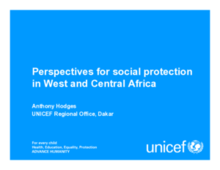This paper discusses a series of challenges (both constraints and opportunities) for building stronger social protection systems in West and Central, a region where formal social protection systems have historically been extremely weak but where the need for mechanisms to protect and empower the vulnerable is perhaps greater than anywhere. Poverty rates remain very high across most of the 24 countries in the region, and progress towards achieving the Millennium Development Goals (MDGs) has lagged behind all other regions of the world.
After a brief review of the main factors of vulnerability and the rationale for social protection in West and Central Africa, including for children in particular, the paper briefly describes the existing social protection systems in the countries of the region, highlighting their current limitations but also drawing attention to emerging new opportunities. It then discusses five sets of structural factors that need to be taken into account in efforts to strengthen social protection in West and Central Africa (WCA). These factors concern the extent of poverty, the nature of inequity, supply-side weaknesses in basic social services, fiscal space and governance/administrative constraints. The paper ends with a discussion of the concept of ‘child sensitive social protection’, highlighting in particular the challenge of developing integrated approaches to social protection, combining social transfers, social insurance, social welfare services and an adequate policy and legal framework.

